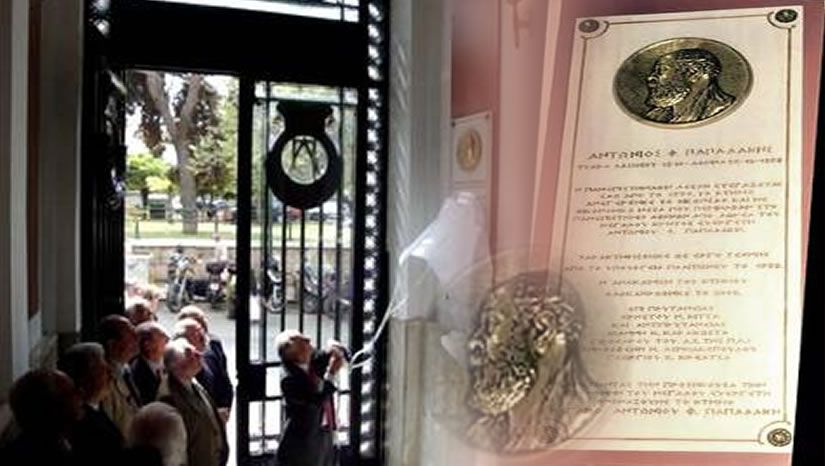
On April 16, an honorary plaque with the name Antonios Papadakis, the great benefactor of the University of Athens, was posted in the building of the University Club. The building of the University Club was erected on a plot bequeathed to the University by Antonios Papadakis, whose estate also covered its construction expenses. The Rector Authorities, following a proposal of the Vice-Rector,Professor Mr. Ioannis Karakostas, decided to post honorary plaques with the names of the benefactors in all the university buildings which have been renovated, donated or bequeathed to our University thanks to them.
The Rector, professor Mr. D. Asimakopoulos, referred to the importance of the contribution of the great benefactors and donors, such as Antonios Papadakis. At the same time, he gave a summary of all the actions of the Rector Authorities regarding the full operational and aesthetic restoration of the historical building of the University Club. Subsequently, the Vice-Rector, professor Mr. Ioannis Karakostas, referred to the importance of paying today the tribute due to the great benefactors. He was followed by the Mayor of Oropedio, Lasithi, Mr G. Miliaras, who spoke about the worthy child of the Cretan land, Antonios Papadakis. Finally, professor Mr M. Kassotakis, also hailing from Psychro, Lasithi, himself, gave a presentation of the major milestones in the life of Antonios Papadakis.
Antonios Papadakis was born in 1810 in Psychro, Lasithi. After Crete was occupied by Ibrahim Pasha, and the tragic death of his parents, he and his brothers were captured and taken to Alexandria. He was later taken as a slave to Istanbul, from where he managed to escape for the city of Odessa. He was there taken under the protection of the prominent Philhellene, Alexander Sturdza. With his help, after Antonios Papadakis completed his studies in the Greek language, worked for some time in the Greek printing house of Odessa and then enrolled in the Agricultural School of the city. After completing his studies in 1833, Alexander Sturdza gave him the position of manager of his estate in Bessarabia. Having worked hard in this position for years, he was rewarded by Sturdza, who conceded to him part of his land so he could cultivate and exploit them himself. This enabled him to acquire significant property and in 1848 he relocated to Athens. He lived a simple life, with the goal of realising his vision, which was none other than supporting the education of the Greek nation. At the same time, he supported his particular homeland, Crete, by founding a school in 1858, in Psychro, Lassithi, paying both the teacher's salary and covering any other need that arose. He participated in the Central Committee of the Cretan Struggle in Athens and offered around one hundred thousand drachmas to support the Cretan revolution, which, by a tragic twist of fate, was suppressed by his brother who had converted to Islam and was the Minister of Defence of Egypt at the time. He was also very active in the reorganization of the Athens Poorhouse. Finally, he served as an advisor of many charity institutions and was a member of the Board of Directors of the National Bank of Greece.
In his will, dated 1 July 1868, which was published in Athens, on 3 January 1879, he named as heir of all his mobile and immobile property, the University of Athens, with the clear instruction: “With this fund ten young Greeks, one from the Peloponnese, one from Epirus, one from Thessaly, one from Macedonia, one from Thrace, one from the Ionian islands, one from Athens and three from Crete, will study in its establishments according to its regulations”. Moreover, he stipulated that “The above ten Greek students, should receive one hundred drachmas a month throughout their studies in the University alone”. He also left the following bequests: To the Society for Promoting Education and Learning three thousand drachmas, the National Orphanage for girls three thousand drachmas, to the Hatzikostas orphanage also three thousand drachmas, to the Poorhouse of Athens five thousand drachmas and to the Athens Technical University three thousand. To honour him, the University Senate held a memorial to the greatest of the Benefactors of the Institution and erected his marble bust in the courtyard of the historical building of the University of Athens, while his portrait hangs in the Senate Meetings hall and his name is engraved in the columns of the Great Benefactors right after that of its founder, King Otto. Finally, the University covered the expenses for building his marble mausoleum in the 1st Cemetery of Athens.